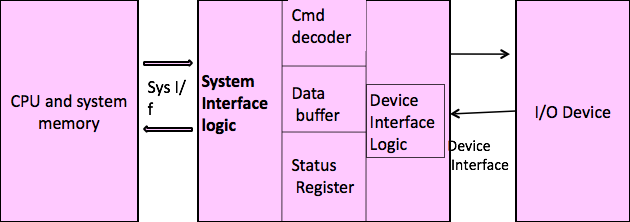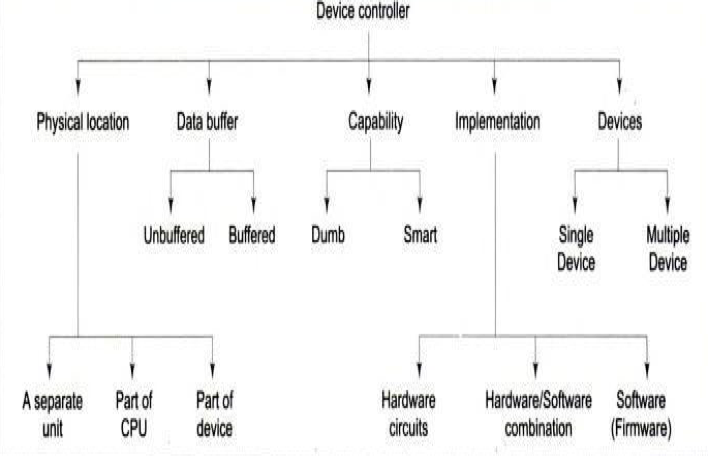Advertisements
Device controllers
- I/O devices are connected to CPU through controller
- Function of device Controllers
 Functions of device controllers:
Functions of device controllers:
- Interfacing with computer system (CPU/Memory)
- Interfacing with I/O device
- Receiving commands from computer
- Decoding commands
- Generating control signals to I/O device
- Transferring data from computer to device
- Transferring data from device to computer
- Converting data from one format to another
- Error Checking on data
- Retrying command automatically on encountering error
- Correcting error
- Analyzing status of device
- Interrupting CPU for data transfer/ status transfer
- Providing device status to CPU when asked for
- Testing the device
- Self test (Controller diagnostics)
Controllers -> Dumb Controllers and Smart Controllers
Dumb Controller
-
Performs only limited function like data transfer & Command decoding other functions by computer software.
-
Based on pure hardware circuits
Smart Controller
-
Performs everything required to control I/O device. So, CPU/ S/w don’t have these tasks
-
Based on CPU
Device Controllers types

- Controllers may support one/multiple devices
- Also controller may support more than one type of device
| Controllers | No. of device | Type of device |
|
Printer Controller |
1 |
Printer |
|
CRT Controller |
1 |
CRT monitor |
|
Floppy Controller |
4 |
Floppy disk drives |
|
Hard disk drive controller |
2/more |
Hard disk drives |
|
Common floppy/ hard disk controller |
Both floppy disk drives & hard disk drives |
Controller Commands
Data Transfer Command
- R/W commands to Floppy disk/ Hard disk controller involves transfer of data between Computer(CPU/Memory) & I/O device
- Print Command to print controller involves transferring data from computer to printer
2. Positioning or Mechanism Control Commands
- Seek command -> floppy disk/ hard disk controller involves moving r/w head to desired track
- Skip command -> printer controller -> moves paper by desired no. of lines
3. Status Transfer Commands
- Read Status Command transfers status information from floppy or hard disk controller to system
- Sense device status command
- Status of device is transferred to system, when given to device controller
4. Diagnostic Commands
- Diagnostic command from system testing of device controller/ device by device controller
5. Mode Control Commands
- Many varieties & vary with device & controller
| Controllers |
Can be controlled to be in |
|
Floppy disk controller |
Single / Double Density Mode |
|
CRT Controller |
25 lines x 80 char or 25 lines x 40 char mode |
|
Printer Controller |
Normal / Condensed / Enlarged Mode |
|
Communication Controller |
Asynchronous / Synchronous mode |
- Data transfer rate & Data Transfer mode can be selected by mode command
